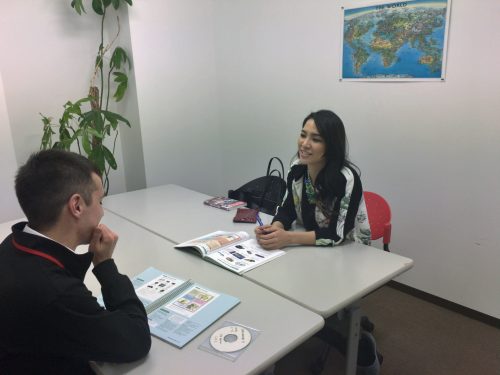カテゴリー:未分類
「英語・英会話 アミック」ミスユニバース
ミスユニバースの愛媛県代表に選ばれた福岡佳奈子さんは、全国大会に向けて今様々なレッスンをされていますが、アミックでも英会話をサポートさせて頂いています(o^^o)v
今週からは東京に拠点を移しての活動になるとのことで、今後はスカイプレッスンに切り替えての指導になります。
医師でもある佳奈子さん。美貌と知性を兼ね備えて、尚且つ努力を惜しまないその姿勢は素敵です。
レッスンの様子は、本日14日夕方6時15分からの南海放送ニュースCh.4の中で放送されるそうです。
ぜひ、皆さんも佳奈子さんを応援してくださいね(^_^*)/

「英会話・英語 アミック」Snapchat
I’m definitely not one to endorse (or condone) using any form of social media, but I will admit that I’ve been having fun keeping in touch with a small group of friends back in the United States by communicating through Snapchat. If you’ve never used this application, basically you mostly communicate by sending very short videos (I believe 10 seconds is the limit) and you can also do a bit of private messaging. The interesting thing is that all of your video uploads can only be viewed and then replayed once, and all of your messages will disappear after the window is closed. It may sound strange, but it’s refreshing in an age of endless digital content uploaded on a daily basis. It’s also fun just to see a little moment of a person’s life instead of a long-winded video that no one has time to view anyway. It’s been my favourite way to communicate online recently because it connects me to people that I really miss but not in an overwhelming way.
Joe
英会話・英語 アミック Thai New Year
When I lived in Thailand a few years back, I always got excited about celebrating Songkran. Songkran is celebrated on April 13th and marks the Thai New Year. Depending on the location, it is usually a three-day holiday that is famous for its water festival.
In the morning, families visit temples and offer food and new robes to monks. Water is poured over Buddha statues which symbolizes cleansing and washing away bad luck. The main water festival is most popular amongst young people. In the past, the custom involved sprinkling scented water on people. Nowadays, it is basically a huge water fight! Streets are lined with people ready to drench you with water pistols, cups and buckets of water and even low pressure hoses. They put wet, chalky powder on your face as a blessing and for protection against bad luck.
When I first experienced Songkran, I had a blast…the first two days. By the third day, I had had enough and was using the back streets and alleys, dodging people to try and avoid getting soaked. But, wherever I turned there was always someone with water waiting to bless me!
สวัสดีปีใหม่ - Sawadee Pee Mai! (Happy New Year!)
英会話・英語 アミック How do you tell a good story?
Each story we hear or read has a similar structure: a beginning – introducing the characters and setting; a middle – what the characters were doing and why, this usually includes a climatic and exciting event; finally an end – how the characters achieved their goal and any consequences of that. This format does not however, guarantee a good story – it is what is happening in our brain that determines whether we perceive the story as good, bad or indifferent.
So what’s going on behind the eyes? Firstly, there is a process called neural coupling taking place. This process activates areas in the brain which allow the listener, or reader, to associate the story to their own ideas and experiences. Secondly, the process of mirroring comes into effect, research shows that listeners and readers experience similar brain activity to the writer or narrator. This can determine the popularity of the story. Thirdly, the brain releases a hormone called dopamine when it experiences an emotionally charged event (remember the climatic and exciting event?). Dopamine allows people to recall more easily and with greater accuracy. Finally, the extent of cortex activities also have an major impact on a story, when we process facts two areas of the brain are activated, whereas a well told story engages many additional areas such as the motor cortex, sensory cortex and frontal cortex. This gives us more connections with the story and more avenues in order to recall in greater detail.
英会話・英語 アミック Cherry blossom and beer
In spring, one of the best-loved symbols of Japan makes a dramatic sweep across the country.
Sakura (cherry blossoms) bloom usually from the end of March through April in a kind of wave starting in southern Kyushu and working its way northeast. News reports keep the populace up to date on the best places to enjoy hanami (lit. flower viewing).
The undeniable beauty of the delicate pink flowers is offset by a sense of melancholy at their all-too-brief appearance. This is often compared to our own short time spent on the earth. This mixture of feelings is best expressed when completely drunk, of course. And so every year, hundreds of thousands of Japanese of all ages gather beneath the pink blooms, sing karaoke, dance and drink till they fall over.
Enjoy while it lasts!
P.s. Don’t forget the beer!












